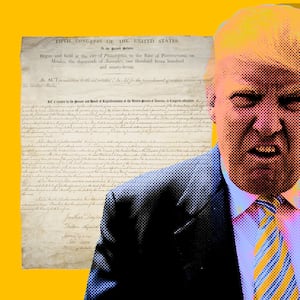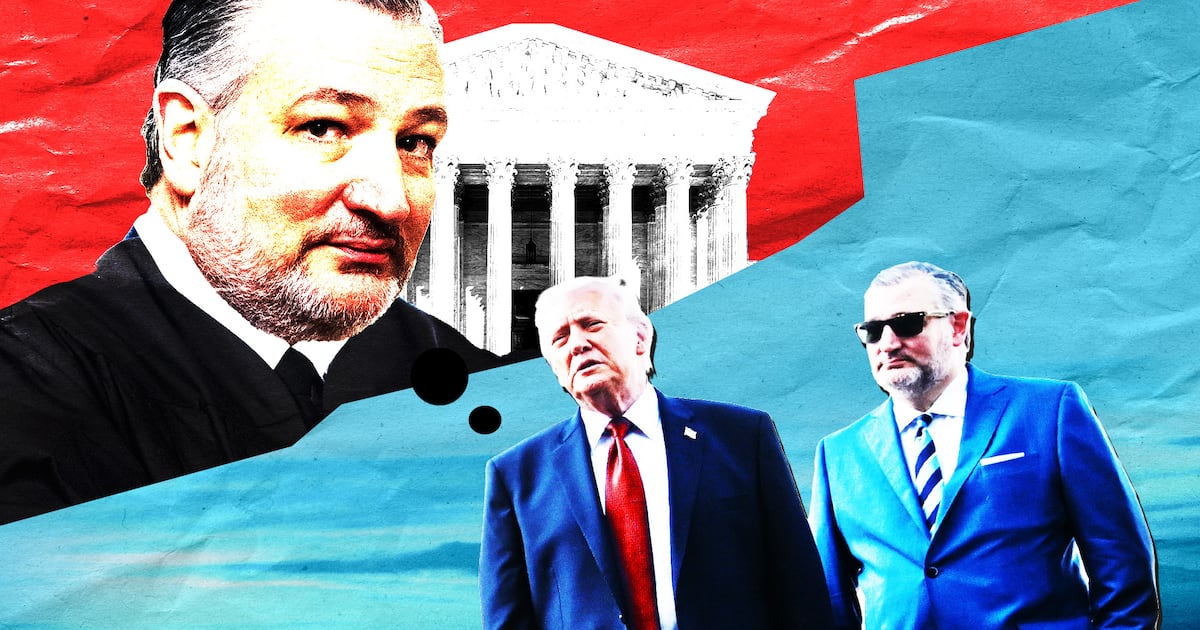Donald Trump has jumped more sharks than a jet-skier at the Great Barrier Reef, so it’s usually not worth remarking on when it happens. But his retweet Tuesday of this tweet is worth pausing over:
That’s the president of the United States of America accusing 11 fellow Americans of treason. Whining about the witch hunt is one thing. But endorsing the view that Robert Mueller and Rod Rosenstein are traitors is libelous. If he weren’t the president, they could sue him.
If he weren’t the president… It’s worth stepping back here as the dragnet closes in on him to think about that. If Trump were a senator or governor, there’s very little doubt in my mind he’d have long ago been indicted on a range of counts. Indeed he might be in jail by now. He’s broken laws in plain sight, in front of all of us. On national television, on his Twitter feed almost weekly, and most recently by telling the New York Post that he wouldn’t rule out a pardon of Paul Manafort, which is obviously an attempt to interfere with the Mueller probe—that is, to obstruct justice.
But he gets away with it all. Why? Because the Republicans won’t do anything, sure, as I and others have written a million times. But there’s another reason. He gets away with it because the Constitution was really badly written on the specific point of how a president should be punished for bad or illegal behavior.
As we know, the Constitution provides for impeachment but is mum on the question of whether a president should face legal punishment for committing crimes while in office. Trump’s defenders repeat this endlessly.
But does that mean the Founders thought a president should be above the law? We need to think about this because when this all comes to a head next year sometime, and we’re counting on the Supreme Court to rule that the president is not above the law (so we hope), we need to be clear about the question that will be confronting the court. Not so much the legal question, but the moral question, which will be: Will you, judicial branch, allow a president of the United States to behave like this? To lie serially, to make completely false and baseless accusations against political foes with no evidence whatsoever? To push our institutions to the breaking point? Putting all your fine legal theories to the side, is this what the presidency of this republic supposed to be: the safe haven of a scoundrel, a witness protection program for a liar and lawbreaker of a sort this country has never seen?
It was mid-July in Philadelphia in 1787, and it was hot, and the delegates to the Constitutional Convention were starting to get cranky. They’d talked a lot about the legislative branch, which they considered the most important, and now they began to discuss in earnest the executive branch.
On Tuesday, July 17, they took up the question of the president’s—or Chief Magistrate’s, as Madison sometimes quaintly refers to the office in his convention notes—tenure of service. At this point, they were leaning toward one seven-year term. But then up rose a founder we do not venerate today, a Dr. James McClurg of Virginia. Most of us may never even have heard of him, but boy do we wish today they’d taken his advice.
McClurg, according to Madison’s notes, stepped up to say that the president’s term of office should be conditioned on his “good behavior.” They debated it for a while; Gouverneur Morris of New York, respected among the delegates and the one chosen to write the Preamble, had his back. And they voted, but it failed, by six to four. Just six to four.
Imagine if a couple votes had flipped and they’d approved this language. It’s fascinating to think about. We’d now be sitting on top of decades of legal debates and court precedents about how exactly to define “good behavior” in a president. No doubt it would have made for ferocious disagreements over the course of our history.
Until now. Who can look at Donald Trump and with a straight face call his “good behavior”? I’d love to read Ben Sasse’s tortured tweets on that point! But honestly, we’d have eleventy jillion polls by now showing majorities of Americans agreeing that Trump’s behavior was well short of good, and that verdict, if McClurg’s motion had passed, would carry constitutional weight. So, heirs to Dr. McClurg, if you’re reading this and know of the founding father in your family tree, long overdue props to your visionary ancestor.
By that Friday, July 20, they got to talking impeachment. Some were for, some against. Ben Franklin’s position was in essence: well, it beats assassination, which to that point had been the most common means for removing a chief executive. James Madison was pro: “[The president] might lose his capacity after his appointment. He might pervert his administration into a scheme of peculation (embezzlement; thievery) or oppression. He might betray his trust to foreign powers” (my italics). Impeachment passed 8-2, with Massachusetts and South Carolina voting in the negative.
So they were pretty clear about impeachment. But they never considered the question of whether a president should face legal jeopardy. Here’s why. The man they all knew would be the first president was also the guy presiding over the convention, who also happened to be a man of genuinely unusual personal integrity. They thought, or hoped, that every president would at least try to emulate George Washington. They didn’t contemplate Donald Trump.
But here we are. As the events of the last 72 hours are rapidly suggesting—and as if we didn’t know it already anyway—we have a man in the Oval Office who if he didn’t break any laws did so only by lucky accident. He’s broken laws his whole adult life. Of course he lied about his Russian interests during 2016. Of course he might pardon Manafort. Of course he wanted Russia’s help in 2016 (he begged for it, for all the world to see!).
I suspect Mueller has learned things that will asphyxiate this country in shock and rage. Then attention, hard attention, will finally turn to the Republicans in Congress, and ultimately to the conservatives on the Supreme Court. And the moral question will hang before them: Whatever legal technicality you wish to lean on, whatever excuse about “originalism” you want to invoke; do you really think the Founders intended for a man like this to be the president of the United States?
The only reason they didn’t make plans for a Trump is that they couldn’t even conceive of a Trump. In a sane world, that should provide all the more reason to hold him to political or, yes, legal account. In the world we actually live in, I fear it will be another excuse to do nothing.







